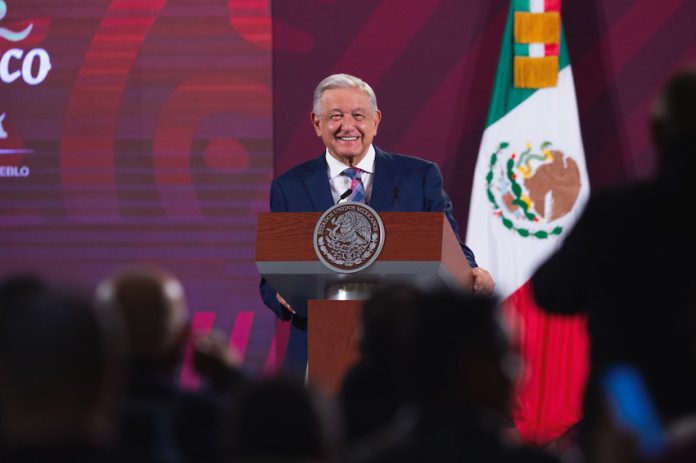The 1968 massacre of students in Mexico City, poverty reduction, the Biden administration’s announcement that it will build a new section of the border wall and tourism in the Caribbean coastal state of Quintana Roo were among the topics discussed at President López Obrador’s morning press conferences, or mañaneras, this week.
AMLO is now just two months shy of completing his fifth year in office, and eager to get as much done as possible before his term as president ends on Oct. 1, 2024.
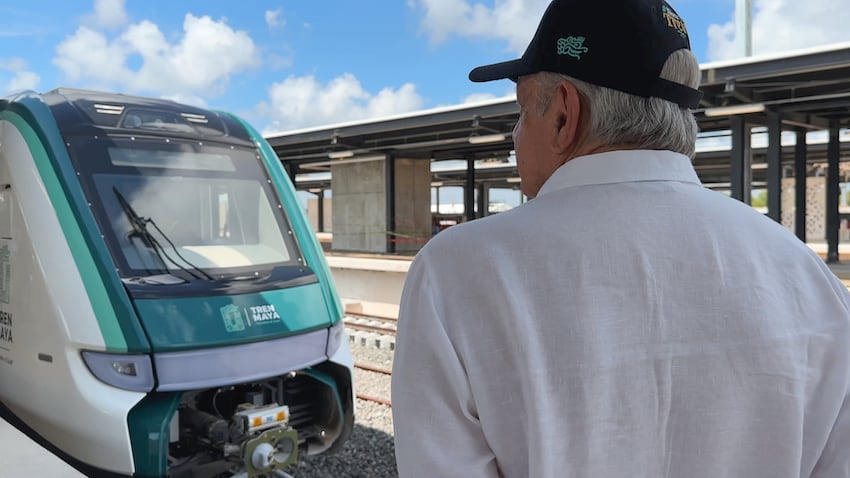
Perhaps his most coveted – and ambitious – objective is to get the Maya Train up and running before the end of the year.
This weekend, López Obrador is once again in southeastern Mexico to inspect progress on his flagship project. To get a head start on his supervisory work, AMLO held his last presser of the week in Quintana Roo before he hopped on the Maya Train later on Friday to complete a test run to the neighboring state of Yucatán.
Monday
AMLO noted at the top of his presser that he had entered the final year of his (not quite) six-year term, as he will hand over the presidential sash to his successor on Oct. 1, 2024.
“We have a year left, one or two days less than a year. But our adversaries shouldn’t get impatient because it’s more than a year,” López Obrador said cryptically.
“As we work 16 hours a day, not eight, and Saturday and Sunday, we have enough time,” he explained.
“… We’re going to continue carrying out the transformation of the country,” AMLO added.
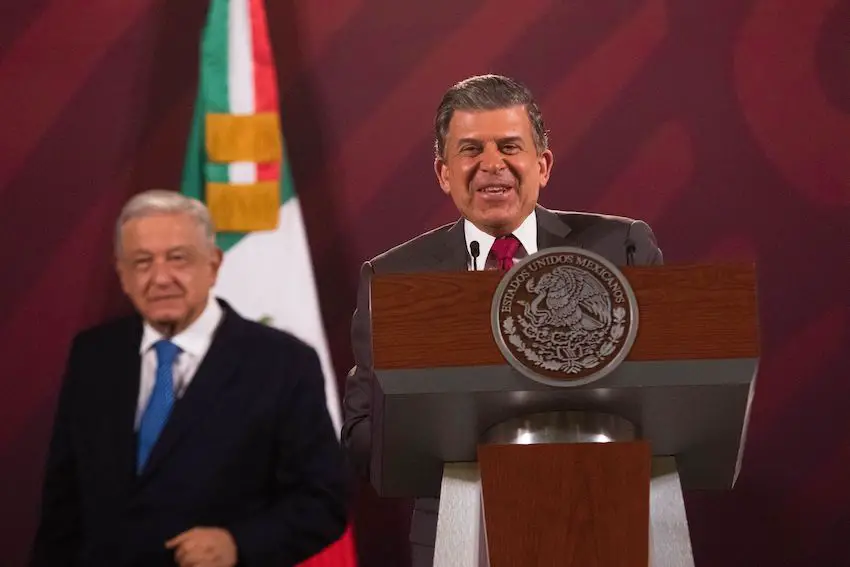
He then handed over the reins of the mañanera to Ricardo Sheffield, who presented his final report on fuel and grocery prices before resigning as head of the consumer protection agency Profeco to begin his quest to become the next governor of Guanajuato.
Across Mexico, the three most expensive gas stations last week were Petro Seven, Windstar and Chevron, while the three cheapest and therefore “allies of consumers” were Repsol, BP and ExxonMobil, he said.
Before opening the floor to questions, López Obrador sent his condolences to the families of 11 people who were killed when the roof of a church in Ciudad Madero, Tamaulipas, collapsed last Sunday. He also mourned the death of ten Cuban women in a truck accident in Chiapas on Sunday morning.
Migrants traveling through Mexico face many risks, AMLO said, before citing some of them.
“[There are] gangs that kidnap migrants, murders and tragedies due to traffic accidents,” he said.
Responding to his first question of the day, López Obrador acknowledged that Andrés Roemer, a former Mexican ambassador to UNESCO and consul general in San Francisco, had been arrested in Israel.
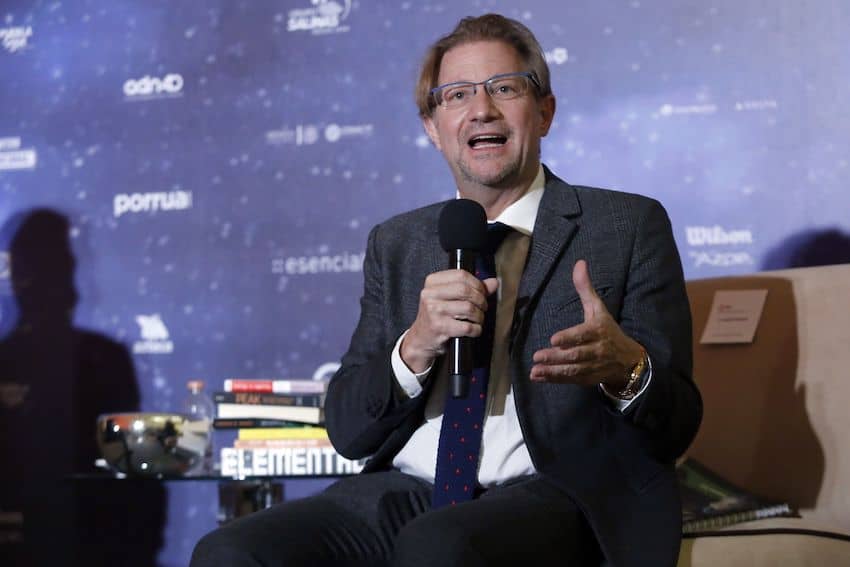
Roemer, who is accused of rape in Mexico, will be extradited, AMLO said.
He said he hoped that Israeli authorities would also extradite former federal law enforcement official Tomás Zerón, who faces charges related to the disappearance and presumed murder of the 43 Ayotzinapa students in Guerrero in 2014.
On the 55th anniversary of the state-sponsored Tlatelolco massacre of students in Mexico City, López Obrador said that the conduct of the army was “reprehensible,” but reminded reporters that it received orders on Oct. 2, 1968, from the president of the day.
“At that time the supreme commander of the Armed Forces was the president Gustavo Díaz Ordaz. I’m not saying anything that isn’t already known. He himself assumed responsibility,” he said.
“In the repression of Oct. 2 there is evidence that those who participated directly were members of the Estado Mayor Presidencial,” AMLO added, referring to the army unit that was charged with protecting Mexico’s president until he disbanded it after he took office.
López Obrador went on to praise the conduct of the army during his government, describing it as “loyal” to the people of Mexico and the country’s public institutions.
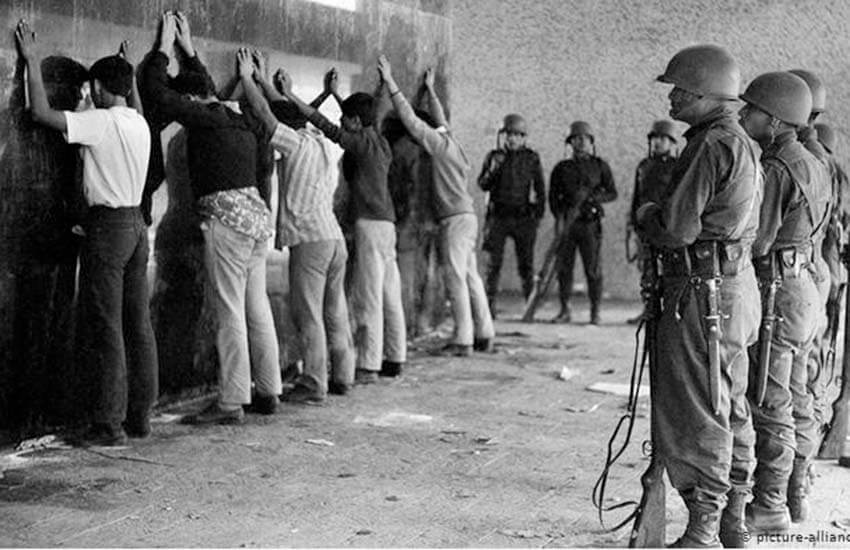
He noted that among the many non-traditional tasks he has assigned the army is the construction of infrastructure projects, including the Felipe Ángeles International Airport, sections of the Maya Train and the Tulum airport, which is scheduled to open Dec. 1.
“When had military engineers participated so much in the construction of projects that benefit the development of Mexico? Never,” he said.
Toward the end of his press conference, López Obrador asserted that he has fulfilled 99 of the 100 commitments he made in his inaugural speech as president in December 2018.
He claimed that the only commitment he hasn’t yet delivered on is his pledge to solve the Ayotzinapa case and hold those responsible for the disappearance of the students to account.
In addition to fulfilling 99 of his 100 commitments – among which were raising the minimum wage and creating the National Guard – López Obrador said he was doing things that he hadn’t committed himself to doing.
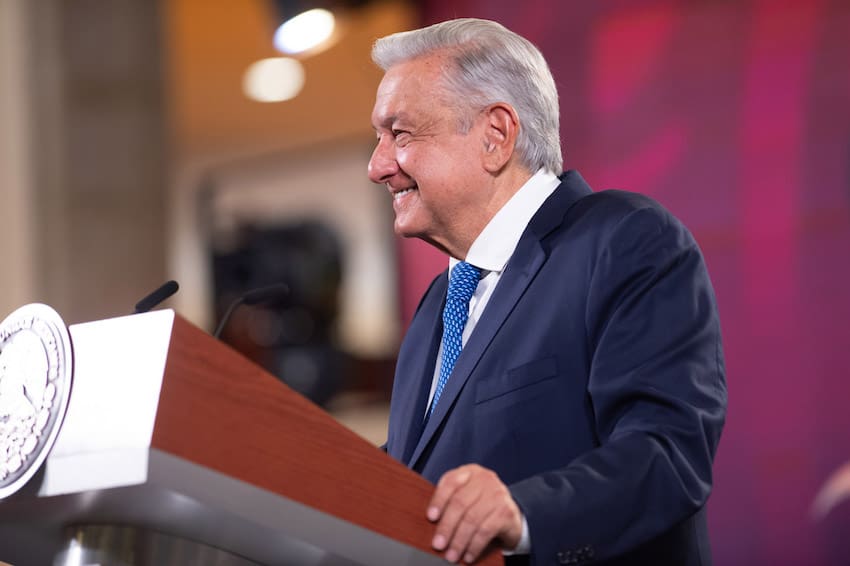
“And I feel very proud of just two things,” he added.
“One is that I contributed to our people changing their mentality,” AMLO said, asserting that a “revolution of consciences” has taken place across Mexico.
“Our people are now more aware than ever. The people of Mexico are among the most conscious in the world, with less political illiteracy than in other countries,” he said.
“… And the second thing I’m very happy about is that, despite the pandemic, poverty and inequality in Mexico declined in the time we’ve been in government,” López Obrador said.
“Previous governments didn’t achieve this,” he said, adding that he will consequently leave office with his mind at ease.
Tuesday
Ahead of a bilateral security meeting at which the fight against fentanyl was a key focus for Mexican and U.S. officials, National Defense Minister Luis Cresencio Sandoval reported that 7,691 kilograms of the synthetic opioid had been seized in Mexico since the government took office in late 2018.
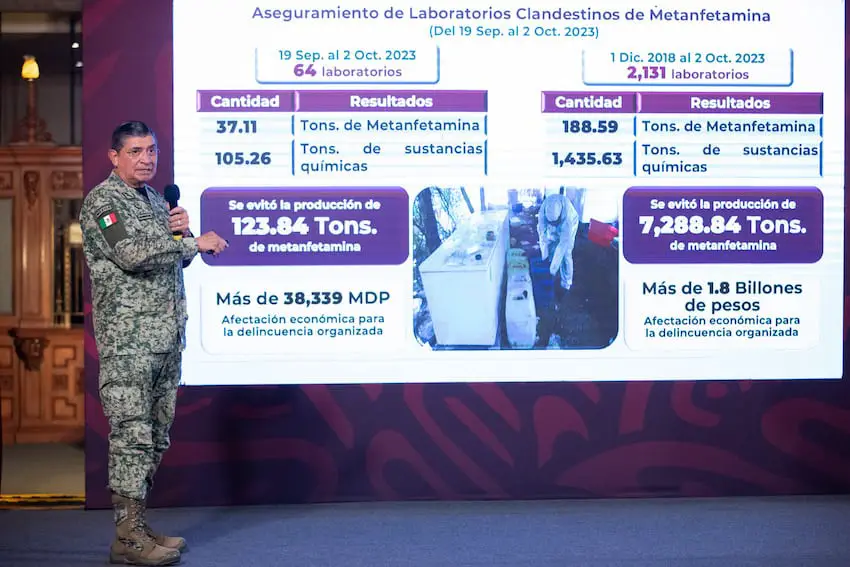
He also provided updates on seizures of other narcotics during the López Obrador administration: over 470 tonnes of methamphetamine, nearly 185 tonnes of cocaine, 726 tonnes of marijuana and close to three tonnes of heroin and opium gum.
Sandoval also said that authorities have shut down over 2,100 clandestine drug labs in the past five years.
Security Minister Rosa Icela Rodríguez subsequently reported that three people had been arrested in connection with the murder of two men who were conducting surveys for the Morena party in Chiapas, and the abduction of their colleague. Authorities seized a pickup truck, a firearm and “objects stolen from the victims,” she added.
“What we want to assure you is that there won’t be impunity in this case,” the security minister said.
Early in his engagement with reporters, AMLO noted that he met on Monday with “a representative of President Biden” – Amos J. Hochstein, the U.S. special presidential coordinator for global infrastructure and energy security.
“We spoke about productive projects, about the arrival of investment to Mexico, about the Plan Sonora [renewable energy initiative], about other projects,” López Obrador said.
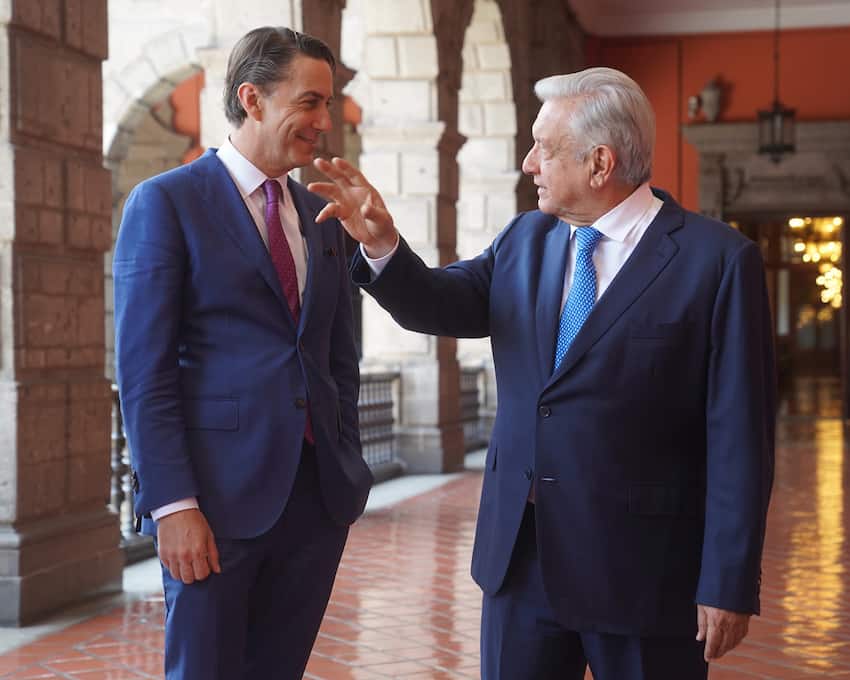
“There is cooperation [between Mexico and the U.S.] on the economy, on trade. It’s already known that Mexico at the moment … is the most important trade partner of the United States. We’re complementing each other, economic integration is strengthening and a lot of foreign investment is arriving in Mexico,” he said.
Asked whether there were any security concerns in the bilateral relationship, AMLO said there were none.
“No, because no. There’s going to be a meeting on Thursday, I believe the head of the State Department, Mr. Blinken, and other officials are coming. … It’s a meeting of the teams that work on migration, security and drug trafficking issues, all these issues,” he said.
López Obrador later reiterated his commitment to finding out what happened to the 43 students who disappeared in Guerrero in 2014 and spoke about a range of other issues related to the case. AMLO appealed to anyone with information about the crime, including people who participated in it and are “remorseful” to come forward.
He noted that people with relevant information about the case could be given “protected witness” status or receive less severe criminal punishment if they cooperate with authorities.
“[There are] a lot of people who can help us and we’re going to look after them, protect them and thank them a lot,” AMLO said.
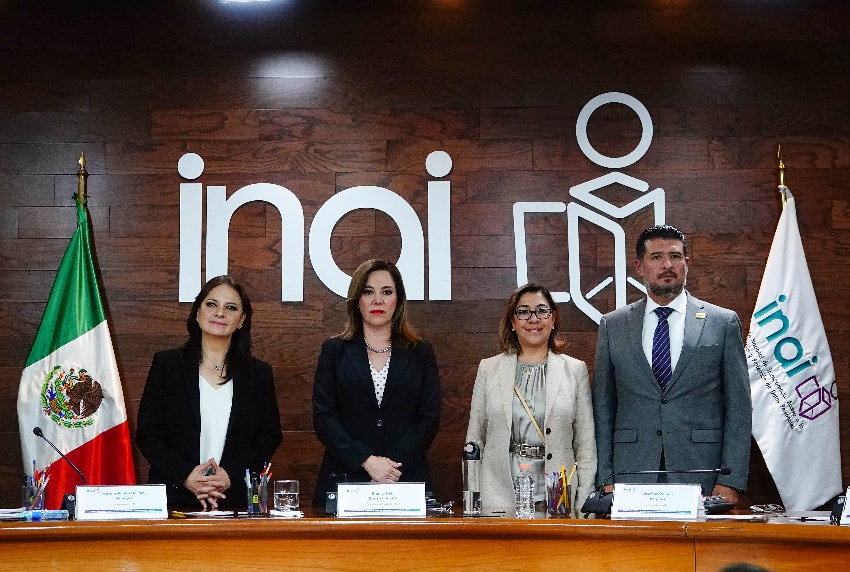
Shortly before the end of the presser, a reporter asked the president about the Supreme Court’s directive to the Senate to name three additional commissioners to the National Institute for Transparency, Access to Information and the Protection of Personal Data (INAI), which has had just four commissioners since April due to the upper house’s failure to make new appointments.
“It’s a matter between the judicial power and the legislative power,” López Obrador said.
“We just regret that the commission was created, that office of supposed transparency that was created in the time of [former president] Fox to simulate that they were going to combat corruption,” he said.
INAI has “never done anything in favor of the people and against corruption,” AMLO added.
“And it’s an apparatus that costs the people 1 billion pesos a year because the commissioners earn more than the president,” he said.
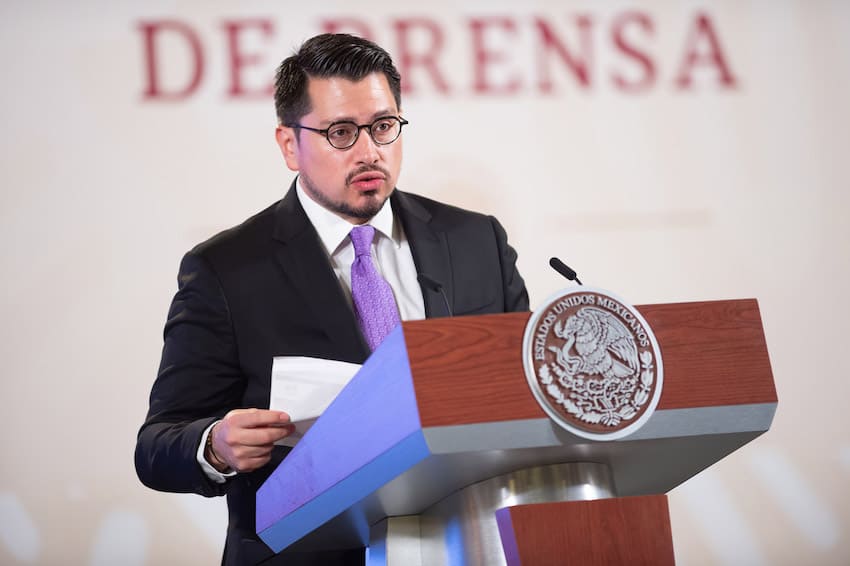
Wednesday
The director of the Institute of the National Housing Fund for Workers (Infonavit) reported early in the press conference that the agency has distributed 1.1 trillion pesos (US $61.1 billion) in home loans since the current federal government took office in December 2018.
“The loan schemes today are more flexible and benefit those who couldn’t access loans before,” Carlos Martínez Velázquez said.
“For example, the Mujer Infonavit program was created this year,” he said, explaining that the scheme offers loans with preferential terms to women.
Martínez said that Infonavit conducted an analysis of the labor market and noted that women “sometimes have a lower salary” than men doing the same job.
“We needed to give women a helping hand. If you treat workers equally, with a blind rule, it’s difficult for women to get a loan that is suited to their needs. That’s why we created the Mujer Infonavit loan,” he said.
Having returned to center stage to respond to reporters’ questions, AMLO announced that Ruy López Ridaura, director of the National Center for Disease Prevention and Control Programs, would replace Hugo López-Gatell as deputy health minister for prevention and health promotion.
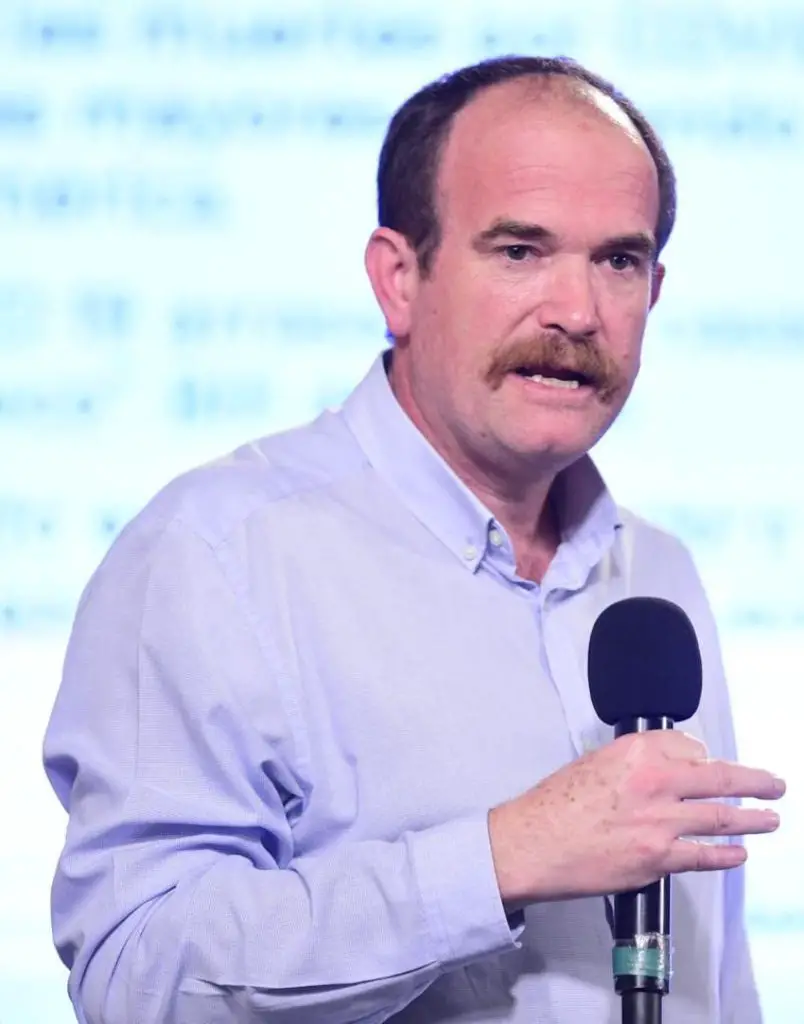
“He’s very good, responsible, professional, scientific, honest. He was here when we were informing about the pandemic and vaccination, sometimes he presented,” López Obrador said.
Later in the presser, AMLO noted that he met with Guatemalan president-elect Bernardo Arévalo in México state last weekend.
“The Guatemalans are our brothers, our neighbors. There are relations of affection, of respect with the people of Guatemala. And we’re pleased that they’ve elected Bernardo Arévalo, who is an educated, humanistic and honest man, who will do a lot of good for the people of Guatemala,” he said.
“… I spoke to him to tell him that we’re going to cooperate with his government and we’re going to help Guatemala, and it’s going to be reciprocal,” López Obrador said.
“… Imagine what Guatemala means to Chiapas or what Chiapas means to Guatemala. … We have a border with Guatemala – Chiapas, Tabasco, Campeche and a part of Quintana Roo [border Guatemala]. Why don’t you put up the map?” he added before acknowledging that just the southern “tip” of Quintana Roo “touches” the Central American nation where Arévalo will take office next January.
A reporter subsequently brought up a 2014 environmental disaster, asking the president what the government would do in light of an Environment Ministry (Semarnat) report that found that residents of Sonora are still suffering from the effects of a massive spill of toxic substances into two rivers from the Grupo México-owned Buenavista copper mine in Cananea.
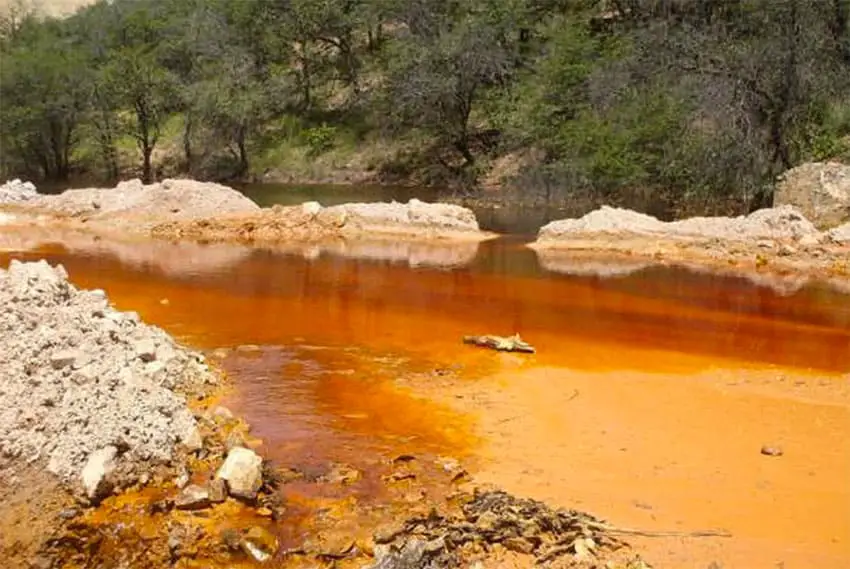
“What will the federal government and the company do with regard to the Sonora River?” asked a reporter who also wanted to know whether a Grupo México trust fund that was created to remedy environmental problems caused by the spill and pay compensation would be “revived” more than six years after it was closed.
López Obrador noted that the Semarnat report had only just come out and said that the government hadn’t yet determined how it would respond.
“We’re going to have a meeting … with the head of the environmental protection agency Profepa, the environment minister … and also listen to the opinions of [Sonora] Governor [Alfonso] Durazo and municipal authorities to see what we’ll do, what we can propose to the company and how to act legally,” he said.
“… We don’t yet have a specific plan,” AMLO said, adding that the government will formulate a proposal within the next two weeks.
Shortly before the end of his midweek mañanera, López Obrador recalled that a 1964 U.S. film, The Night of the Iguana, was filmed in Mismaloya, a coastal village south of Puerto Vallarta, Jalisco.
The film, based on a play by Tennessee Williams, popped into his head when a reporter told him that some Mismaloya residents face eviction due to an agrarian court ruling in favor of a person who intends to build “a tourism complex on their land.”
“We’ll ask the government’s legal advisor to look at the case today,” AMLO said.
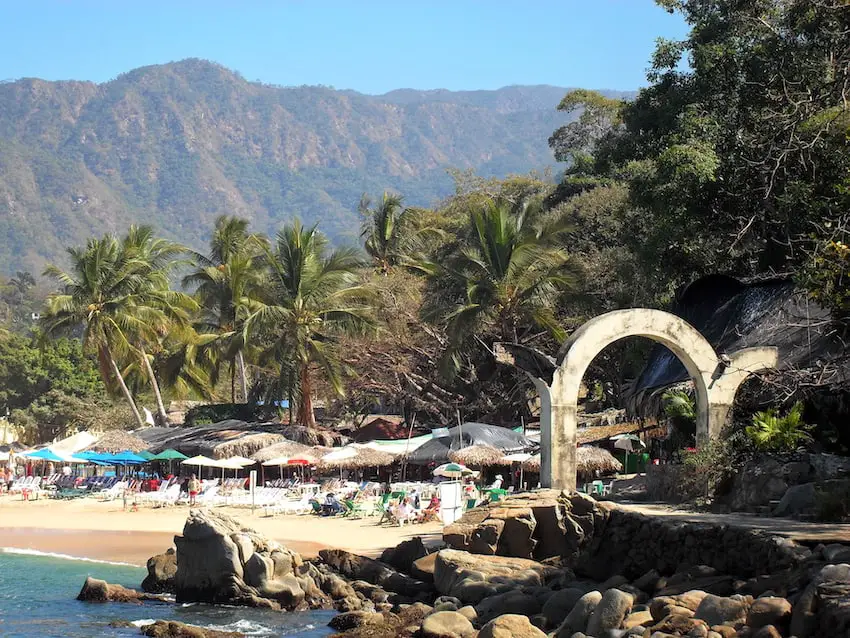
Thursday
Shortly before the commencement of a fentanyl-focused Mexico-United States security meeting, López Obrador expressed sympathy for the loss of lives in the U.S. due to drug overdoses.
“We regret what’s happening in the United States. [The American people] are our brothers and sisters, but they have a fentanyl use [problem] that causes 100,000 deaths a year,” he said.
Mexico, in contrast, records fewer than 1,000 overdose deaths per year, AMLO said.
As he has done before, the president attributed comparatively low levels of drug use in Mexico to the strength of Mexican culture and the Mexican family.
“This is an example of why we have to maintain our cultures, we have to maintain family cohesion, … family unity,” he said.
“The Mexican family, I always say it, is the most important social security institution in the country … because we’re very fraternal. If a member of a family isn’t doing well, other members support him,” López Obrador said.
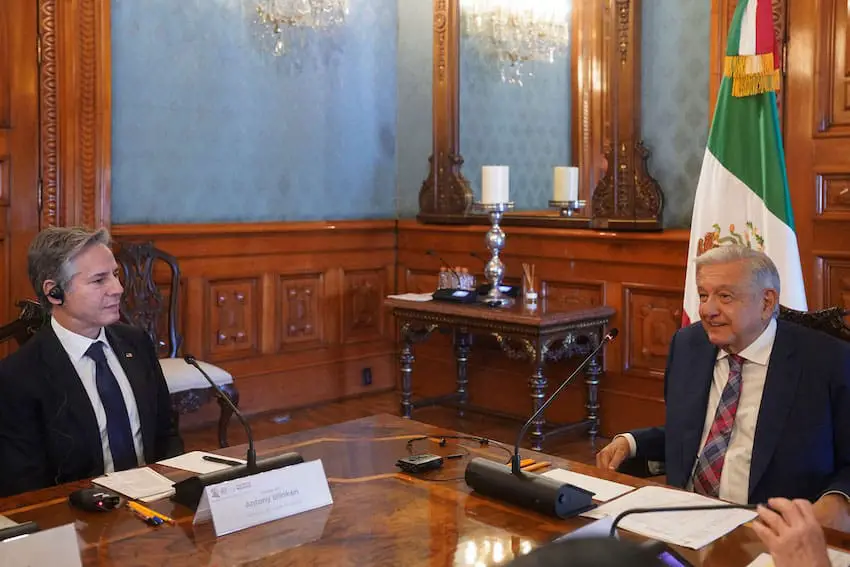
“… In the United States, the kids grow up, get to adolescence and have to leave home, that’s not the case here,” he added. “… They are things that give us strength.”
Later in the press conference, AMLO turned his attention to one of his proudest achievements: poverty reduction. He noted that data published in August showed that poverty declined significantly between 2020 and 2022 before predicting that numbers to be released in 2025 will be even more impressive.
“From 2022 to 2024 is when we did the best [in reducing poverty],” López Obrador said.
“That isn’t measured in the latest survey so it’s very probable that [the results of] the survey that will be announced in 2025 will show that poverty and inequality declined even more,” he said.
Toward the end of a shorter-than-usual press conference, López Obrador acknowledged that the United States government had taken the decision to build a new section of border wall in Texas.
The decision, announced by the U.S. Department of Homeland Security, was the result of political pressure, he told reporters.
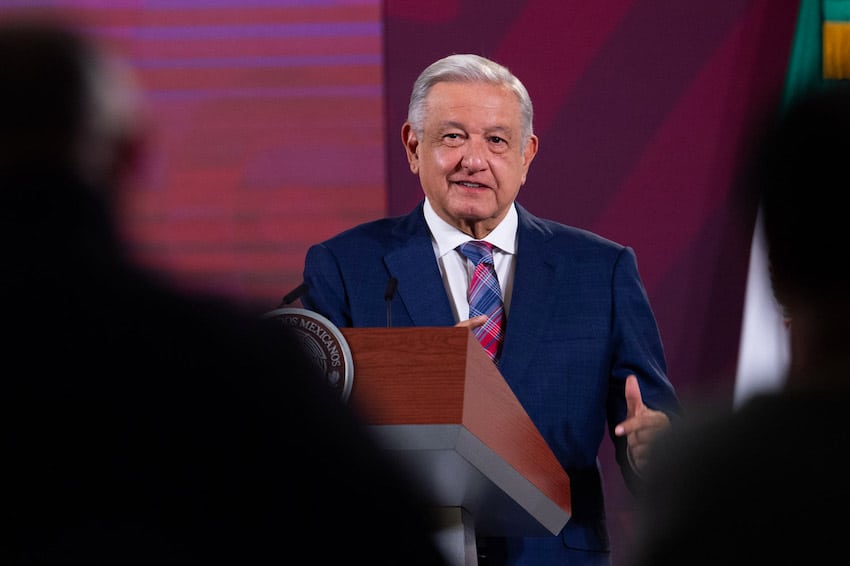
“I understand there is strong pressure from far-right political groups in the United States, especially from those that want to take advantage of the migration phenomenon and drug use for political purposes. There is a lot of politicking when elections are approaching,” AMLO said.
Some Republican Party politicians are “acting very irresponsibly” and placing a lot of pressure on Biden, “who will always have our support,” he added.
“But the authorization for the construction of [more] wall is a backward step because it doesn’t solve the [migration] problem,” López Obrador said.
“You have to attend to the causes [of migration] … [by] creating jobs, attending to young people. With that [we can reduce migration]. We’ve proved it, that’s the remedy,” he said.
“… I’m going now, I’m leaving,” AMLO said a short time later, noting that the meeting with Secretary of State Antony Blinken and other officials would commence at 9 a.m.
“It will be coffee and bread [for breakfast], nothing else,” he said. “… We have an agenda, public servants from the government of the United States and the government of Mexico are going to work all day,” he said.

Friday
“You don’t always wake up in paradise. We’re very happy to be here in Quintana Roo,” López Obrador said at the beginning of his presser before ceding the mañanera lectern to Governor Mara Lezama.
She told reporters that record numbers of tourists arrived in the Caribbean coast state between January and June.
[It was] the best first half of the year of all time,” Lezama said, noting that airport arrivals were up 11.7% compared to the first six months of 2022 and cruise ship arrivals surged 43.8%.
United States tourists make up 38.1% of the market, followed by Mexicans (35.1%), Canadians (8.8%) and Brits (2.1%), she said.
The Morena party governor later noted that Quintana Roo – Mexico’s newest state – would celebrate 49 years of statehood on Sunday.
“On this anniversary I think that the best present we could have is the arrival of the Maya Train,” Lezama said.
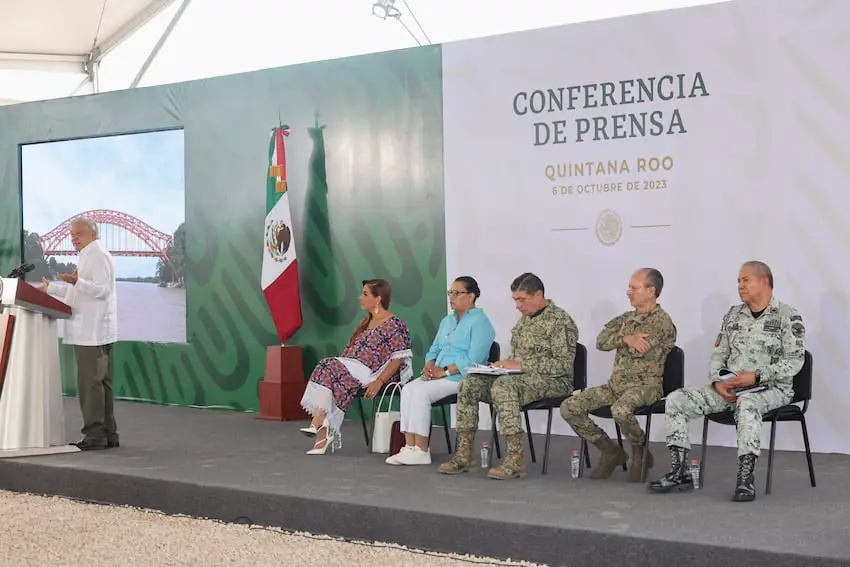
“Today, before its inauguration, which will be in December, the Maya Train is already generating social justice,” she said.
National Defense Minister Luis Cresencio Sandoval reported that the incidence of most crimes is trending downward in Quintana Roo. The state ranks 18th out of the 32 federal entities for total homicides during the term of the current government and 10th on a per capita basis, he said.
AMLO returned to center stage to respond to reporters’ questions and was immediately asked about the government’s flagship rail project.
“In general, progress is being made on the Maya Train,” he said.
“Today we’re going to board the train here in Cancún, we’re going to travel to Valladolid and there we’re going to have an evaluation meeting at the station,” López Obrador said.
He said he would spend the weekend completing test runs on different sections of the railroad in Quintana Roo, Yucatán and Campeche to get an even better idea of “how we’re doing.”
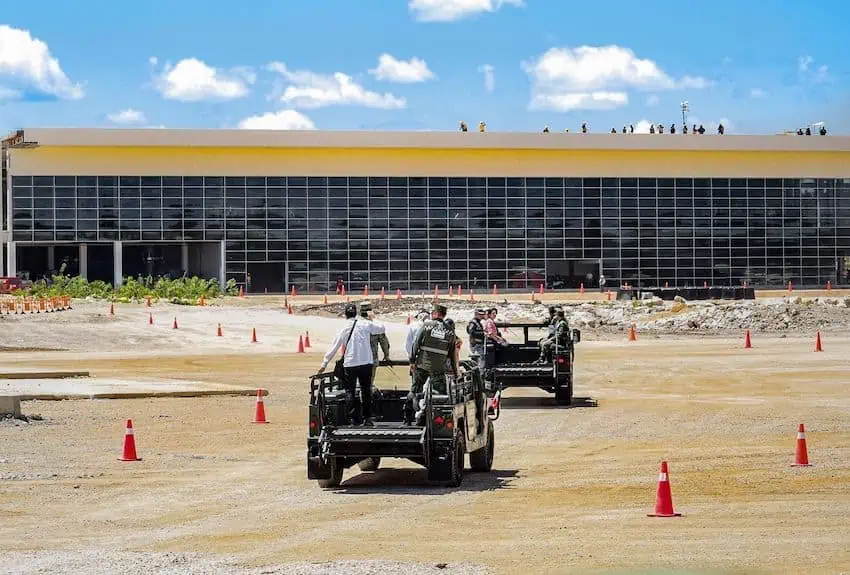
AMLO reiterated that the Tulum airport will open on Dec. 1 and said that the plan was to inaugurate a section of the Maya Train between Palenque and Cancún on Dec. 15.
“There are some challenges,” he said, explaining that one of them was the construction of a bridge across the Usamacinta River in Tabasco.
Asked about the Mexico-U.S. High-Level Security Dialogue on Thursday, AMLO said the meeting was “very good.”
“I was there for more than two hours and I spoke a lot about migration issues, drug trafficking and economic cooperation,” he said.
López Obrador said that Mexico’s view that a border wall “isn’t the solution to the migration problem” was presented to U.S. officials.
“We’ve always spoken about attending to the causes [of migration], that work opportunities and opportunities for young people to study must be guaranteed, so [people] aren’t forced to abandon their countries and their families,” he said.

AMLO said that United States officials made it clear that they don’t want to add to the border wall, but the U.S. government is obliged to do so because funding for the project has already been approved.
“I believe they won’t build [additional sections] … because that’s what tends to happen in other countries and in Mexico as well, … things move slowly. They won’t build the 36 kilometers [of wall], they don’t want to do it, that’s what they told us. They want to comply with the law, but they don’t agree with the construction of walls,” he said.
Toward the end of the mañanera, López Obrador said that the new state-owned airline which is set to begin operating under the Mexicana brand in late 2023 had no current plans to fly internationally.
“We’re going to start in Mexico [with] domestic routes,” he said.
“… The [first] tickets are already on sale and I’m sure they’re going to sell out soon, at least those to Tulum. Do we know how sales are going?” AMLO asked.
“Sales haven’t started,” responded Minister Sandoval, explaining that the Federal Civil Aviation Agency hasn’t yet given Mexicana approval to operate.
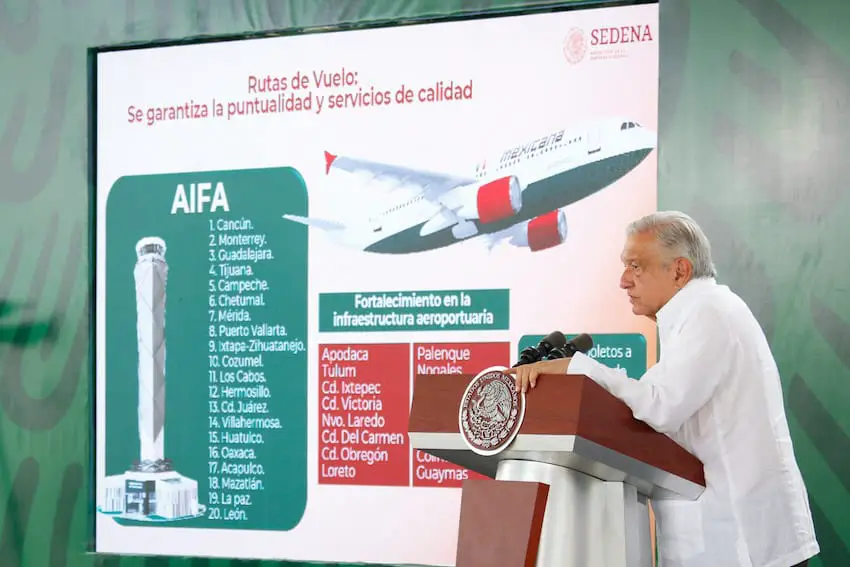
A short time later, López Obrador indicated that he’d had enough of answering questions and was ready for breakfast.
“The tortas de lechón from the Camaroncito Feliz are waiting for us,” he said, referring to baguettes stuffed with roasted pork, a Yucatán Peninsula specialty.
“… About 15 or 20 years ago I discovered that fonda, a modest but first-class restaurant. They have an oven there and we went and found succulent tortas de lechón, the best, the best,” AMLO said.
By Mexico News Daily chief staff writer Peter Davies ([email protected])
